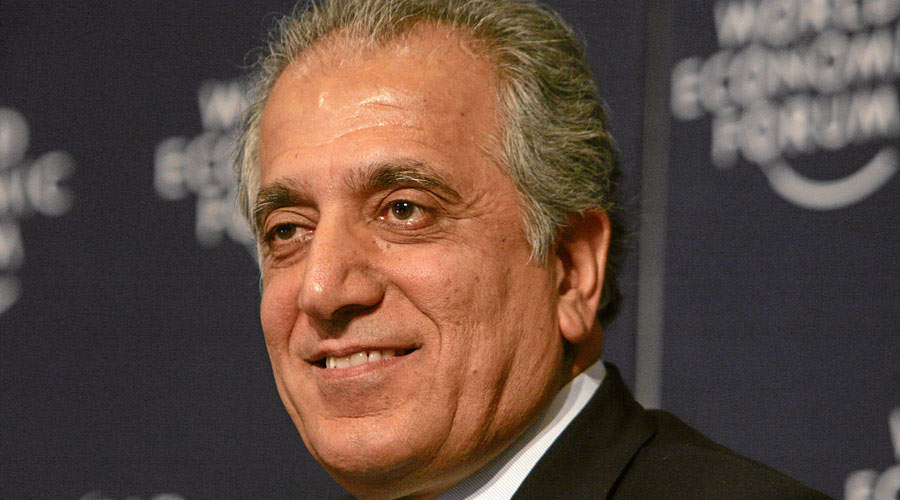In a luxury hotel along Doha’s coastline last year, Zalmay Khalilzad smiled as he shook hands with the Taliban’s co-founder Mullah Baradar in front of journalists and diplomats from around the world.
“We have signed an agreement with the Taliban that achieves US objectives,” Khalilzad, the US’s special representative for Afghanistan reconciliation, wrote on Twitter later that night.
Twenty months later, the US-backed Afghan government collapsed as the Taliban swept through the country at lightning speed and marched into Kabul unopposed. Khalilzad was left seeking the militant group’s help in a chaotic US evacuation from Kabul.
Current and former US officials told Reuters that in the three years Khalilzad has been in the role, he became the face of one of the largest US diplomatic failures in recent memory.
US officials, who spoke on the condition of anonymity, said the veteran American diplomat relinquished leverage to the militant group, continuously undermined the Afghan government, and had little interest in hearing different viewpoints within the US government.
“How does he still have a job?” a US official asked. “There is no longer any Afghan reconciliation left.”
Khalilzad declined to comment on the record.
Some officials, lawmakers and foreign policy experts said that he is one of the few US diplomats to have relations with the Taliban and was simply following orders from both US Presidents Donald Trump and Joe Biden: get all US troops out of Afghanistan.
“Khalilzad looks bad. But I think that he was dutiful in the sense that he did what he was asked to do,” said Michael Kugelman of the Wilson Center think-tank.
Khalilzad, while a major figure in America’s humiliating end to a 20-year involvement in Afghanistan, was one of many people who made mistakes during four administrations — two Republican and two Democratic.
Gave away the farm
When Khalilzad, who was born in the northern Afghan city of Mazar-i-Sharif, was appointed to be the special envoy in 2018, there was a growing political desire to leave Afghanistan.
Having campaigned on ending “the endless wars”, Trump had publicly talked about his desire to remove thousands of US troops in Afghanistan.
But officials said that despite his desire to leave, Trump had shown that he could order a withdrawal only to walk it back, like he did in Syria. In negotiations, officials said Khalilzad gave away too much early by making clear that Washington was looking to withdraw all of its troops.
A major concession, according to the officials, was Khalilzad agreeing to the Taliban’s demand that President Ashraf Ghani release 5,000 Taliban prisoners.
A second US official said that move dealt a major blow to the Afghan government’s morale.
Representative Michael McCaul, the top Republican on the House of Representatives Foreign Affairs Committee, said he thought Khalilzad had been given an impossible assignment.
“I think he almost got caught up in that assignment, that he was going to be successful, he was going to get this deal cut, he was going to make a difference,” McCaul said.
‘Viceroy of Kabul’
Afghan officials were sceptical from the moment the Trump administration entered into direct talks with the Taliban, without the Afghan government at the table.
Roya Rahmani, who was the Afghan ambassador to Washington until July, recalled Khalilzad’s refrain earlier in the negotiations that “nothing is agreed until everything is agreed”, a message meant to reassure Afghans and Americans alike.
“What happened was there was an agreement that only ensured that the Taliban — during that period of time —would not attack US personnel and soldiers, but then everything else is allowed,” Rahmani said in an interview this week.
During the negotiations, the US and Afghan government clashed publicly.
In March 2019, Hamdullah Mohib, Ghani’s national security adviser, levelled a fierce attack on Khalilzad’s conduct, questioning whether he was perhaps seeking power himself. “The perception in Afghanistan and people in government think that perhaps, perhaps all this talk is to create a caretaker government of which he will then become the viceroy,” Mohib said.
The comments by Mohib were not new.
As the US ambassador in Afghanistan from 2003-05, Khalilzad played an unusually hands-on role in Afghan politics and Afghans referred to him as the“Viceroy of Kabul”.
There was also widespread frustration within the Trump and Biden administrations that Khalilzad did little to listen to the Pentagon.










